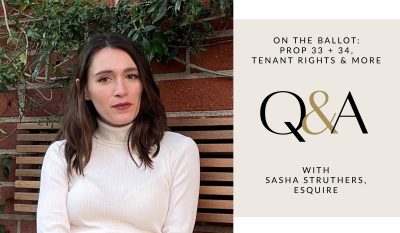
With the election quickly approaching (November 5th), now is a great time to learn more and dig a little deeper on what’s on the ballot. One of the most important Propositions relating to real estate and investments in real estate will be Proposition 33. Why should you vote no on 33? Proposition 33 essentially repeals Costa Hawkins, which exempted single family residences, condos, and new constructions from rent control. If you own a single family home, for example, and want to rent it anytime in the future and want to be able to set the market rent (ie raise the rent), passing Proposition 33 will take away that right.
I asked lawyer Sasha Struthers of Struthers Legal, an LA-based firm representing landlords and property management companies throughout California, to explain further. Read on to see what Sasha has to say about Prop 33, Prop 34, tenant/landlord rights, and more.
California has Proposition 33 on the ballot this election. Can you explain what that means?
Proposition 33 is a ballot measure to repeal Costa Hawkins, which exempted single family residences, condominiums and new construction from local rent control. It also allowed landlords in rent controlled properties to be able to charge market rent when a unit became vacant. Proposition 33 would allow local jurisdictions to impose broad and sweeping rent control over all residential property. For example, a local jurisdiction would be allowed to require all home owners to register their homes and pay a rent control registration fee, even if the home was not rented. Local jurisdictions would also be able to impose vacancy control, which would also kill all multifamily property values, by stifling a property owner’s ability to raise rents to market upon a vacancy. This would leave the landlord trapped with low rent and the property not appreciating. Lastly, if local jurisdictions imposed vacancy control on new construction, then new construction would stop. There would be no upside for the developer in the long run as the rents would be essentially fixed day one and little upside would ever be gained. No on 33.
Proposition 34 is on the ballot. Could you explain that one too?
The man behind Proposition 33 is Michael Weinstein of the AIDS Healthcare Foundation, a non-profit that is supposed to help AIDS patients get access to more affordable medicine and services. However, Mr. Weinstein has been using the foundation funds to sponsor rent control ballot measures; Proposition 33 is his third attempt. Proposition 34 would prevent him from using the foundation funds for anything other than the core purpose of the foundation. It would require the foundation “to spend 98% of revenues from the federal discount prescription drug program on direct patient care”. Yes on 34.
Often, renters vote for tenants rights and it ends up working against them. What are the long-term effects of passing a ballot like this?
It would likely result in landlords taking existing units off the market and new construction would stall out and disappear. This would further squeeze supply. The issue with high rents in California is very simple: Supply v. Demand. There is a huge demand in California but the increase in regulations has resulted in not enough housing being built to keep up with demand. We see it in the single family residence markets as well as the tenant market. Many tenants would have actually become homeowners by now, but the high cost of homeownership has kept many tenants renting longer than they planned to be. If a landlord cannot make money on their property, they simply will not rent it. If rents stay low while costs continue to rise (insurance, supplies, labor, property taxes, utilities, etc.), then the landlord cannot pay out of pocket for tenants to live in their properties. Instead of trying to further control rent, the focus should be on building more single family residences and apartments to satisfy both demands. Many of these tenants would then be homeowners themselves, which I believe is the goal of most Americans.
Real estate is one way to build generational wealth for the typical working person. Is there a way for a good landlord to protect themselves from tenants who take advantage of these laws?
This is a hard question to answer. Landlords have so many new regulations they don’t know about, many of which expose them to costly lawsuits. All landlords should sign up for an association that fights for them and keeps them informed. I am a member of AAGLA (The Apartment Association of Greater Los Angeles). They do webinars, have vendor lists, advocate on behalf of property owners, and have forms that landlords can use. The biggest thing landlords can do for themselves is show up to city council or rent board meetings and express their concerns, share their realities. When landlords show up you would be surprised that people do listen. Above all, you can’t give up on the fight for property rights. Once landlords give up it is very hard to get any rights back and will set up the next generation for failure. If you have kids that you plan to pass your real estate down to then talk to them about these things, not to stress them out, but to educate them. Kids today are the next generation of leaders in this country – the next generation of decision makers.
Can you explain the new Just Cause law that makes it harder for landlords to control their properties?
Many local jurisdictions are imposing “Just Cause” eviction restrictions, which means, once a tenant moves into a residence (single family, condo, or apartment), the owner cannot simply end their tenancy when the lease is up. The owner has to have cause, such as failure to pay rent, lease violation, owner occupancy, etc.
This is tough for owners of single family residences and condos in jurisdictions with “Just Cause” restrictions because the landlord can’t just serve a 60 day notice to get the tenant out. Many of these situations result in tenant buyouts being done, where the owner pays the tenant to move out. Many tenants are reasonable, but some use tactics to be punitive and advantageous against landlords, trying to squeeze as much money out of the landlord as possible.
In the areas of LA that have rent control like Pasadena, what have been the effects?
For one, there has been a huge uptick in evictions. Landlords are so afraid of tenants that they are no longer being lenient about late rent or lease violations. Many landlords are filing Ellis Acts, so they are permanently going out of the rental market. Other landlords are converting properties into other uses or ownership structures to get out of rent control. Lots of smaller “mom and pop” landlords are selling the properties to developers and institutional landlords.
—
If you’re a landlord in California and have any questions on the legal implications of these ballot propositions, or anything else rent control, landlord rights, etc., send me an email and I’d be glad to connect you with Sasha! You can also get in touch with her via her website: struthers.legal



























